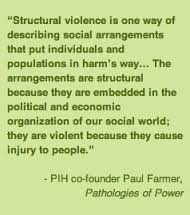The last few days I have had some time, maybe too much time, to think about all the injustice in our world and the inhumane ways we treat each other. In the last few weeks, a number of people have lost their lives due to urban violence, people have put off needed surgeries because they cannot afford the deductibles, and this morning the Supreme Court gutted the Voters Right Act, leaving the door open for legislation, which would prohibit the rights of all Americans to vote. Each of these acts, as well as others, is related in that they are all forms of structural violence.
One need not look further then the local television station, newspaper, or internet provider for examples of physical, emotional, and mental violence. The one form of violence not discussed is structural violence.
Structural violence, however, is usually invisible, embedded in ubiquitous social structures, normalized by stable institutions and regular experience. Structural violence occurs whenever people are disadvantaged by political, legal, economic, or cultural traditions. Because they are longstanding, structural inequities usually seem ordinary—the way things are and always have been. But structural violence produces suffering and death as often as direct violence does, though the damage is slower, more subtle, more common, and more difficult to repair.[1]
Structural violence contributes to expressions of direct violence as well as the silencing of individuals and communities. Unable to find the language through which to express their needs and speak their truth, those who have been oppressed often times turn to direct violence as a form of story telling and expression of their suffering.[2] The combination of the structural and direct violence often times leaves community members “unwilling or unable to confront social injustice.[3]” Structural violence is a form of warfare, which devastates neighborhoods sociologically and economically. The victims of this war are those who society considers “the least of thee”; they are the ones who endure the immediate and long-term effects on their communities.
Another factor, which contributes to this silencing, is individualism, or as Johnson calls it “the myth that everything is somebody’s fault.”[4] Analysis of the situation focuses on what people are not doing or how they have brought their situation on to themselves. This exclusionary way of thinking draws attention away from the systemic forces, which create discomfort and fear and focus on a “blame the victim” type of mentality. This focus on individuals is comfortable; as we understand, we are individuals and can recognize and see each other as such. Many are less aware and comfortable with the concept of systemic inequality or systems in general. It becomes difficult to talk about the existence or effect of these systems if we are not able to talk about them or their effect on human lives.[5] It also makes it difficult for us to even look at or discuss our own involvement in these systems. This misfocused attention places us in a state of paralysis where we are unable to transform our silence into language and action.
Structural violence can only exist with our cooperation and compliance. It is time for us transform our silence into language and action. It is time to say No more structural violence. Until then there will not be peace on earth. So let the effort to stop this insidious form of violence begin with us.
[1] Deborah Du Nann Winter and Dana C Leighton. “Section II Structural violence“ in Peace, Conflict, and Violence: Peace Psychology for the 21st Century ed. D. J. Christie, R. V. Wagner, & D. A. Winter (Englewood Cliffs, New Jersey: Prentice-Hall. 2001), 1.
[2] Ibid., 2.
[3] Ibid., x.
[4] Allan G. Johnson, Privilege, Power, and Difference. Boston, Mass: McGraw-Hill, 2006., 77.
[5] Johnson, 77.

